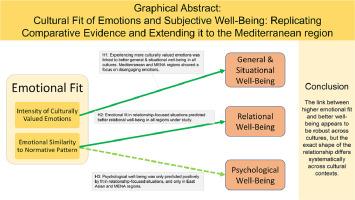Cultural fit of emotions and subjective well-being: Replicating comparative evidence and extending it to the Mediterranean region
Abstract
Greater “emotional fit” with one's cultural group is often associated with positive psychological and relational outcomes. However, the few empirical studies on this link have been limited to the comparison of Anglo-Western, independent, and East Asian, interdependent cultural contexts. In the current paper, we conceptually replicated findings from three studies on the link between emotional fit and well-being in Anglo-Western and East Asian contexts, using different methods and more comprehensive samples. Moreover, we expanded emotional fit research to the understudied Mediterranean region, characterized by an emphasis on “honor” and a distinct blend of independence and interdependence. We collected data from N = 3,097 participants from 12 countries and asked participants to report their emotional experience in 10 hypothetical situations and to rate their well-being in different domains. Our results largely replicated established positive links between emotional fit and well-being in the Anglo-West and East-Asia, as i) experiencing more culturally valued emotions (from which we infer cultural fit) was linked to better general well-being; ii) actual, calculated emotional fit in relationship-focused situations predicted better relational well-being; and iii) only in East Asia calculated emotional fit in culturally central contexts predicted psychological well-being and thriving. Our exploratory analyses on the Mediterranean region showed a non-homogenous pattern: while general well-being was consistently most strongly predicted by the intensity of disengaging emotions, relational and psychological well-being were differentially predicted by calculated emotional fit in relationship-focused situations across different Mediterranean sub-regions. The current work consolidates insights into how our well-being is shaped by the interplay between culture and emotional fit and strengthens evidence that there may be ‘universalism without uniformity’.


 求助内容:
求助内容: 应助结果提醒方式:
应助结果提醒方式:


